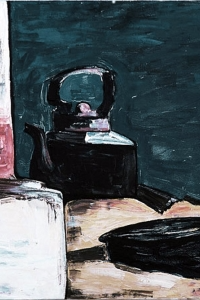
She fumbled with her fingers, as if fretting with an imaginary strand of beads. Her gaze downcast, she hurriedly took in her surroundings out of the corner of her eye. The brown blinds and wood panelling, dark green couches and coordinating rug, a small humidifier in one corner of the room.
He spoke to her again.
‘Well, let’s put it this way. Life was going on, you were getting your education, starting a job, starting a family and then, something—’
‘I have been in counselling before,’ she interrupted. ‘But this time it’s different. It’s the house, actually, not us.’
‘Interesting . . . well, why don’t you tell me more about the house? You and your husband have lived it in for how long?’
‘We just bought it,’ she responded slowly, her sadness seeming to fill the room.
To search for a house had not been an easy decision. In fact, in some ways, deciding to buy a house had been tougher than the actual hunt. The economy had crashed so badly that hope was tempered by caution, even when all signs began to look promising. But they had decided to move forward. Renting no longer yielded the conveniences that suited their current lifestyle. And hosting events at clubhouses was more and more looked down upon. Not to mention that sitting by their personal swimming pools, the other couples always looked so happy. Bringing out trays of warm pakodas to serve under the deliciously cool winter sun. Touching each other’s hands from time to time, rubbing cheeks on shoulders. So a small house would do, but one was needed.
‘So where did you buy? There are some nice areas around here.’
She thought his voice sounded more condescending than curious.
“In Copperstone Ranch. It’s a very upscale community, and very, very pretty,’ she responded, as if needing to convince herself. ‘It has lakes and waterways built in, interweaving gardens and water features. It’s in the Palm Bay area too; the whole area is . . .’
She left the line unfinished, recalling the days in the beginning, when she had landed by herself in a strange city. A desert was something she was not used to, having grown up in a tropical climate and then spending years in the lush Finger Lakes Wine region in upstate New York. She’d driven by golf courses and artificial lakes and waterways, disgusted at the waste. The denizens of Mesa were certainly not living in harmony with nature, she’d thought to herself, later relaying the same on the phone to her husband. She’d also described the small localities with dilapidated houses and Help Stop Domestic Violence signs everywhere. The city housed extremes, she concluded.
At first she’d gone to the small groceries and swap meets in those looked-down-upon neighbourhoods. Stuff, especially pottery and furniture, was much cheaper. She’d once brought her husband along to look at potteries. He’d been quite astonished and agitated at her stupidity. Couldn’t she see that her car stood out too much amongst the others in the lot? Phoenix had the highest number of carjacks, after all. She’d gradually stopped going. Rather, unthinkingly, she still drove past the little shops but no longer stopped.
When they first met, his apartment had been exceptionally bare. Men were seldom into elaborate furnishings, but his minimalist décor was something she had never encountered. The scarcity was striking. A bare futon on the floor, a few books on a desk with no chair. She gradually understood why as she got to know him. He believed in simplicity and humility. Possessions often brought pride, which he shunned with deliberation. She couldn’t say the same about herself and felt guilty at this inadequacy. Material possessions— pretty clothes, shoes and bags—admittedly attracted her; she had plenty of them. Growing up, she’d been taught to value possessions as achievements. Her mother, a fiercely independent working woman who stood out from her homemaker peers, flaunted the sarees she bought with her own salary—‘Well, you are self-reflecting. That is good, taking a moment to pause and ground your thoughts. That’s key to mindfulness’—she felt herself jolted back into the dimly lit room. Staring blankly at the origin of the words, she tried to remember where she had left the conversation.
‘Mindfulness is very important,’ he continued. ‘It’s key to being where you want to be emotionally.’
She echoed the phrase in her mind. Where did she want to be emotionally?
‘So how was the house-buying process?’ he inquired, in the same tone, intended to be soothing, He merely assumed it had been the process of buying a house that was stressful enough to have this young woman sitting on his couch. He had treated many with similar ailments—going through major life events, like marriage, remodelling or buying a house, getting burned out in the process.
‘We looked at many houses,’ she replied. ‘We looked at old ones, old but nice. Smaller mostly. Also at new ones, with lots of upgrades. There was this old one, quite small actually, but very pretty. A lake in the backyard! In Phoenix! And a pool overlooking the lake.’
‘Why didn’t you buy it then?’
‘Well, it was too small, and also a little old. We would have had to do most of the upgrades ourselves, you know. We weren’t sure if we’d be able to do that.’
She fell silent again, then spoke in a faraway tone.
‘Ashish had always said he wanted a smaller house though. We don’t need too much space; it’s wasteful. That’s what he’d say.’
‘So you were the one wanting more space?’ he inquired, with practiced patience.
She didn’t respond for some time. The session was looking to be more complicated than he had initially perceived.
‘I should come back another day,’ she said, finally, looking downward again.
He watched as she wrapped a strand of her long hair around two of her fingers. She looked different today. A little more energetic. Or maybe it was the bright yellow dress she was wearing.
‘We didn’t quite get to the problem last time,’ he said, lightly, hoping to take advantage of her seemingly elevated mood.
‘Yes, I know. I will make up for that today,’ she promised in a less sombre tone than usual.
She spoke rapidly then, describing how she had found love with a man of similar values. A man who liked simplicity. How she was repelled by the individuals from her country who had made it in life, earning good salaries here and back home, and had forgotten to do anything about the less fortunate. Who justified nonchalance in a loud voice and concentrated on acquiring assets and accolades. Her husband agreed, sharing equivalent revulsion toward such people. In fact, he surpassed her feelings, his contempt extending to most material possessions. A quality she lacked, but wistfully admired.
They’d chosen their friends carefully, the ones adhering to values. The liberal university setting allowed them to do so. There was no shortage of socialists, activists and idealists. Some were environmentalists, some human right activists, all of them intense in their commitment to their causes, expressing purgatory dissatisfaction at material possessions and evaluating their existence every day. One believed in not having a cell phone or a credit card, another bought only recycled clothing to minimize impact. They all fit in well together, sipping on fair trade coffee in a liberal town, smug with pride in their values and promises of being different. For example, there was the little Russian, who had come to US at the young age of eleven and abhorred American wasteful ways as well as the choice his family made to give him a ‘better’ life. At the coffee shop, he took only one napkin and no sleeves or lid for his coffee. Another had been born to devout upper-caste Hindu parents in a strongly caste-abiding community. He now vocalized atheism and communism through the short films he made for his college class. And lastly, the most important one of them all, her husband. The Punjabi by birth who had rejected the customary pomposity of his community and lived like a monk instead.
Listening, he felt that he was grasping the underlying problem at last, a crisis evolving around identity, a struggle to hold onto the cherished and justify the change. He shifted in his chair and cleared his throat in preparation for delivering guidance.
‘There is nothing wrong in wanting a better life, and we are designed to be nurturers,’ he told her. ‘As we advance in age, we gravitate toward security, and that being a rather relative term, everyone sets a different standard for what will make them feel secure.’
He spoke in an assertive but non-confrontational tone, feeling that the girl sitting in front of him wouldn’t accept clichés. She had probably thought of them all herself already.
‘So you think it has nothing to do with greed?’
Her voice showed more emotion than it had in all their conversations so far.
‘Nothing to do with forgetting where you come from and trying to belong with only the upper stratum? Wanting things you had convinced yourself and others you’d never want?’
‘Well, there is probably a component to wanting to be better that can be classified as greed. But it is grey area and depends on perception. For example, in certain cultures, wanting and displaying even the basics might be viewed as greedy and lacking humility. While in others, there’s no limit to what you can want for yourself, as long as you do that without hurting others.’
‘Every time I want to buy a used piece of furniture, which he knows I am capable of refurbishing and making quite unique, he prohibits it. He is afraid of bugs, he says. So we buy only from high-end stores. No need to customize anymore, no need to impart your personality with your creativity. You already did that with your money. It’s a piece only you can afford,’ she said, all in a single breath.
‘Let’s go back to the house again, before we talk of greed,’ he suggested.
It was their third session. She looked tired today, with visible circles under her eyes and her hair ruffled, in contrast to her usual impeccable appearance. It had been a busy week for him, and he’d had to refer back to his notes to know where they’d left off. He always liked to start from the exact ending point. That gave structure to tracking the progress being made. He had colleagues who believed otherwise; the benefits of unstructured conversations versus systematized ones had been debated over wine and cheese many a time.
‘What did you think life would be like once you moved into this house?’ He asked with intention hoping to get an answer that had some too.
She looked startled at the question, maybe surprised at how quickly they had come to the point today. But her answer was direct. She’d considered it mainly an investment but also an opportunity to explore her creativity.
‘I like decorating,’ she said. ‘I was excited about the things we would do together, picking out furniture and painting walls. But he doesn’t even want to hang stuff on the walls. He thinks nails will damage them.’
‘What about furniture? You usually agree on choices, or no?’
He guessed the answer, but the goal was to help her access and voice her feelings.
They didn’t agree on furniture, of course, and cost more than style was the differing matrix. The style he was willing to compromise on.
‘Don’t you ever want nice things? How about a nice locality?’
People often associated location with safety, a topic they had touched upon, but a fuller discussion would help her catalogue unstructured thoughts from the subconscious.
She had wanted a nice house too, it was hard not to. But she didn’t want to want that. Each time they drove through localities labelled ‘upscale,’ she was bothered by their lack of character. Manicured streets with well-dressed joggers and pretty mothers with strollers gave her far less comfort than tattooed men with guitars and clusters of women in brightly collared clothing and small shops overflowing with old books and junk furniture. Guadalupe was a neighbourhood she had liked, with its tropical orange- and fuchsia-collared bus stops and men and women chatting on the streets. But living there would have been unthinkable. The area was notorious for drug raids and other violence. Even the quaint bistros with colourful confetti hanging outside were unsafe to go in and risk leaving their shiny car outside. So she hadn’t mentioned stopping for lunch at any of the cafés they passed. Her husband would have been very irritated and that would have spoiled the mood for the day.
She had wanted a house with a pool though. A luxury definitely, but one she had dreamed of since her childhood. Water calmed her, and something about being able to be in water in your own house—‘that was the first thing that made me want to buy a house in Phoenix,’ she told him, sounding nearly excited. ‘Anyone could have a pool here. Almost anyone.’
But a pool had been one luxury Ashish hadn’t wanted. He thought it wasteful to have a swimming pool in a desert. She’d seen a glimmer of the old Ashish when they’d discussed this. They had gotten a pool in the end, but the topic resurfaced anytime they had a discussion about sustainability and living simple. She didn’t mind seeing the old Ashish, but she also didn’t recognize him in the new one she was getting to know. Maybe opposing the pool had been only to oppose something she wanted? That seemed to be the only theme consistent with everything else. Or was she being bitter and imaginative? Maybe it was consistent with his current choices, and she was just not seeing the connection?
‘We are out of time today,’ he interjected diplomatically, taking advantage of the pause that had come after a long monologue. Today had been quite productive. They’d reached the stage often accomplished with patients in an initial session. But sometime it took a few sessions, which was all right too. Identifying the problem rather quickly was important, so that he could ponder the best course of action to follow. Not starting on that route in timely fashion meant losing the patient. Counselling was not like elevating physical symptoms, which could yield tangible results almost immediately. So providing a sense of empowerment and well-being early on was important. In her case, future sessions would be relatively easier to facilitate. He could help her analyze the built-up resentments in her marriage and advise practices to dissipate negative emotions or, if the problem was beyond repair already, help her to realize the extent of the issue, including recommending separation. He had had significant experience with both courses of action.
She walked out of his office feeling lethargic and overwhelmed with all that had been discussed. She felt that she was in a happy marriage with someone who shared her values. Not necessarily her hobbies and interests, but values. Yet she was bothered by the notion that Ashish’s bewildering lifestyle choices stemmed from some new intention to oppose her. Was she admitting that it wasn’t his value system that had shifted? Rather, he just didn’t care for her wants and needs anymore and was doing things out of resentment? Wasn’t ‘admitting’ the wrong word? It implied something was true when it might not be. Or were the two things not very different at all, one merely the cause of the other and vice versa?
She hadn’t slept well for the last few nights. Maybe that’s why her thoughts seemed clouded. The new memory foam mattress that Ashish had wanted so badly didn’t suit her. She longed for their old futon as she tossed and turned, but the mattress salesman had advised giving it sixty days to allow the body to get used to the low-resilience foam. Sixty days seemed unreasonable for a two thousand dollar mattress. The price should have guaranteed immediate comfort. Well, at least for Ashish, it had.
‘How long do you and your husband plan to be in Phoenix?’ he asked the next time they met, as usual following up on one of her earlier comments. She’d mentioned thinking of the house as an investment, something they would sell in a couple of years when they needed to leave Phoenix. She had insisted on buying, the time was right with low prices and interest rates. But she had never insisted on staying. Ashish didn’t want that either. After all, he wanted to return to India.
‘So you are planning to go back to India?’ he said, with some interest.
‘Yes, we did want to go back’—her voice was so soft that it seemed to be coming from the faraway land itself—‘we still do,’ she corrected herself.
Still speaking softly and almost with a little embarrassment, she added that it was very important to Ashish, more so than to her.
‘He likes it there. He is very close to his family.’
‘And what about you? Do you like being here? Or would you rather go back?’
This answer would be important, he thought to himself.
‘I . . . I don’t know anymore . . .’
Her voice trailed off as she thought of home. Images of the bustling street by her house, hearing her mother shouting in the background. The streets were so dirty, and the main bathroom was leaking again. But then there was the evening breeze, the comfort of being all right with having less, because so many around had less than that.
She stared at him, her silence conveying more than she could in words.
‘I think it might be good to start you on a low-dose antidepressant,’ he said, adopting a clinical tone. ‘In lower doses, it helps with anxiety.’
His voice startled her back into present-day US. The humidifier, the darkened room, the couch.
‘I want to talk a little bit more about India,’ she said, with a determination in her voice that surprised him. ‘I want to talk about why Ashish wants to go back.’
‘Yes, of course. You were saying he is quite close to his family?’
‘Yes, that too. But he also hates wastage. He doesn’t like that we can get whatever we want here. Use as much electricity as we like, get hot water off the tap. All our friends installed an R/O; they are terrified to drink tap water—in US! They have forgotten the water they used to drink. They are worried of microcontaminants.’
In her enthusiasm, her near-perfect English reverted slightly. She paused to take a breath, and he used the opportunity to interrupt. Was it Ashish she was talking about? Or was this how she felt?
She was driving home quite slowly, she realized as a horn blared sharply behind her. Thirty-five mph when she could go forty-five. On NPR they were talking about healthcare expenses. The hospitals billing the insurance companies, marking up the prices significantly, seemed to be a big component of why healthcare cost so much in this country. One of the panellists seemed adamant that not doing so would compromise the quality of care. Lower-quality care was a scary and taboo concept. No one wanted lower quality, even if that would be sufficient. Sufficiency was almost synonymous to deprivation.
She was sitting in the dark when Ashish came home that evening. He was concerned; she hasn’t been answering her phone, and he’d had to get a ride home from co-worker. Why hadn’t she let him know that she wasn’t coming back to work after her session? She stared blankly at him, lacking answers for the inconveniences she had caused. She had switched on the pool fountain and the pool lights as well. It was something Ashish usually disliked—wastage of electricity, he reminded her every time. But she knew it was not so much the electricity as the monthly bill. There was a difference. A very subtle but important difference. If the electricity were free, would he care as much about the social or environmental consequences?
‘The doctor is starting me on antidepressants for anxiety,’ she said.
Ashish sat down beside her, taking her hand in his.
‘Why are you worried?’ he asked. ‘You have been on those before. There is nothing wrong in that if it helps you. Make sure your plan covers it though. Last time your counselor billed you for co-pay, but it was covered under your HRA.’
She started to get up, but he stopped her lovingly. He was going to book a vacation for them. To seaside, something he knew she loved. It was a promise he had made some time back. A promise she had forgotten about, in exchange for a Mexico trip she had agreed to cancel. She and a couple of friends had wanted to travel around southern Mexico, backpacking and staying in youth hostels. Ashish had promised a much better trip instead, one to a nice resort by a beach. Something more suited to the time and place they were in life right now.
It was three a.m. Wide awake, she roamed the house, taking stock of each room as she passed through—each space beautifully arranged with carefully chosen accessories. The effect was one of unperturbed perfection. She knew they were not going back to India. They were going to be in this house until they moved to an even bigger and better one, trapped forever in the contentions of convenience.
About the Author







Comments